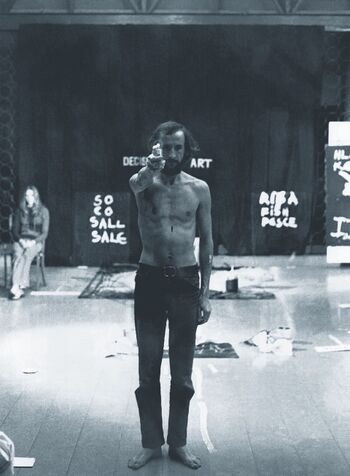Raša Todosijević
Raša Todosijević (2 September 1945, Belgrade, Yugoslavia - 3 December 2024, Belgrade, Serbia) graduated from the Academy of Fine Arts, Belgrade, in 1969. He exhibited in numerous solo and group exhibitions in Serbia and abroad, and has published several books. His works are included in numerous museum and private collections, and in 2011 he represented Serbia at the Venice Biennale.
Contents
Todosijević is one of the main protagonists of Belgrade’s conceptual artists group. In the early 1970s young artists (including Marina Abramović, Era Milivojević, Neša Paripović, Zoran Popović and Gera Urkom) gathered in Belgrade’s Student Centre, where a new form of artistic expression was conceived, later called Nova umjetnička praksa (New Artistic Practice). Todosijević’s performances were marked by provocative and aggressive behaviour, often flirting with sadism. He created artworks in which he explored the medium and process of painting, demystifying the artistic act itself, ironically connecting it to the act of work and ‘hand exercises’. His texts are among the most important critical writings on art in the region.
In the 1990s he began a series of pseudo advertisements – for instance, advertising the great fictional Todosijević Art Academy, a fictitious corporation Todosiyevitch-Malevich, and celebrating the 150th anniversary of the fictional school Dragoljub Raša Todosijević – employing obvious lies using conventional media language in order to subvert the principles of advertising.
In the cycle of installations Schlafflage (meaning ‘sleeping flag’) created between 1978 and 1984 he created autonomous incomprehensible symbols, and in yet another cycle of installations, drawings and sculptures started in 1989, Gott Liebt die Serben (‘God loves the Serbs’), he gives nationalism an ironic twist by bringing its kitsch aestheticism to the forefront. In 1998 in Belgrade and Čačak, he served his guests the Serbian national dishes of beans, bread and beer on tables shaped into a swastika. (2018, upd.)
Major performances and actions: Marinela (Belgrade 1971), Decision as Art (Edinburgh - Belgrade, 1973), Drinking Water (Belgrade, 1974), Was ist Kunst? (Paris, Biennale de Paris, 1977), Was ist Kunst? (Wien, Oesterreichicher Kunstverein, International Performance Festival, 1977), Was ist Kunst? (Lublin, International Festival of Performance and Body Art, 1978), Vive la France - Vive la Tyrannie (Amsterdam, Works and Words, 1979).
Catalogues[edit]
- Raša Todosijević. Was ist Kunst?, Belgrade: Geopoetika, 2002. (Serbo-Croatian)
- Hvala Raši Todosijeviću, ed. Dejan Sretenović, Belgrade: Muzej savremene umetnosti, 2002. (Serbo-Croatian)
- Raša Todosijević, Belgrade: Muzej savremene umetnosti, 1982, [8] pp. With text by Jerko Denegri. (Serbo-Croatian)
- Dragoljub Raša Todosijević: sutra je ponedeljak / Tomorrow Is Monday, ed. Sanja Kojić Mladenov, Novi Sad: Museum of Contemporary Art Vojvodina, 2022, 136 pp. (Serbian)/(English)
- Was ist Kunst? Dragoljub Raša Todosijević, eds. Jakub Král and Matěj Smrkovský, Prague: Galerie hl. města Prahy, 2023, 72 pp. Publisher. Video reports: Artycok.tv, Czech TV. Exh. reviews: Natálie Drtinová (Flash Art CS), David Bláha (A2). (Czech)/(English)
Interviews[edit]
- "Rasa Todosijevic on Art, Beer and Beans", SEEcult.org, 22 Apr 2008.
- "Raša Todosijević in Conversation with Dietmar Unterkofler", ARTMargins, 8 Jun 2011.
Literature[edit]
- Dejan Sretenović, "Time, World and Raša Todosijević", Feb 2000. Lecture given in the School of the history and theory of art of the Center of the contemporary art, Belgrade.
- Ješa Denegri, "Raša Todosijević's Art of Decision: A Protagonist of the International Art Scene", n.d. (English)
- Seraina Renz, "‘Art and Revolution’: The Student Cultural Center in Belgrade as a Place between Affirmation and Critique", kunsttexte.de/ostblick 3: "Mythmaking Eastern Europe: Art in Response", ed. Mateusz Kapustka, 2014. (English)
- Branislav Dimitrijević, "Raša Todosijević - 'Was ist Kunst?'", in Kontakt. The Art Collection of Erste Fondation, Cologne: Walther Konig, 2017, pp 341-343. (English)
- Ondřej Vojtěchovský, "Raša Todosijević, jedno z dětí revoluce", Quartal 10, Prague: GHMP, 2023. (Czech)
Links[edit]
- Biography, [1]
- Peščanik.net
- Scribd
- Tate, Kontakt Collection, Avantgarde-Museum
- Tributes: Vesna Milosavljević (SEEcult.org) [2], Sanja Kojić Mladenov (Dnevnik), Aleksandra Ćuk (Danas), M. Đorđević (Politika), М.Краљ-М.Мирковић (Novosti), Ivana Mikić (Blic), Miljana Kralj (NIN), MG+MSUM, M.K. (MMC), Branislav Dimitrijević (Kontakt).
- Wikipedia-SR
